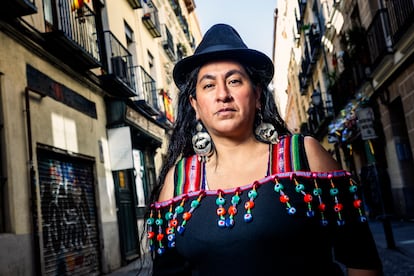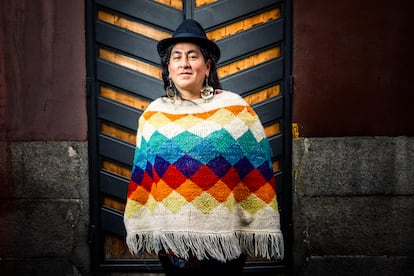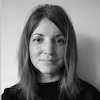Adriana Guzmán, Indigenous Aymara woman: ‘Eurocentric feminism has a paternalistic gaze, it perceives us as an anecdote, something exotic’
The Bolivian activist, writer and popular educator calls for better coordination among global women’s movements in order to confront a ‘patriarchy that presents itself in the form of fascist groups’

Adriana Guzmán (La Paz, Bolivia, 47 years old) was born in the month of February. “During Carnaval,” she says. This fact left its mark on her character. “Not because of the happiness, quite the contrary; because of people calling out inequalities, religious oppression, colonialism, the boss, the landlord, racism… but while having fun.” That’s how she does it. The activist, writer, popular educator, Indigenous Aymara woman, lesbian and mother of two daughters is a militant for community feminism.
A member of the Feminismo Comunitario Antipatriachal (in English: Antipatriarchal Community Feminism) organization and of Feministas of Abya Yala (in English: Abya Yala Feminists), she speaks nearly entirely throughout our interview in plural, because she does not understand her struggle in the singular. She is “we,” in the feminine. When she is not traveling the world to share her community-based ideation of feminism, the defense of nature and the right to “live well,” Guzmán lives in the mountains at an altitude of more than 2.4 miles, an hour and a half from the Bolivian capital. “An arid place. I like the cold, the wind, the drizzle. Also, the sadness, which is part of life.” On a layover in Madrid, after having participated in a few events in San Sebastián focused on education and women, to which she was invited by the Basque government, she begins our conversation speaking of the earthly: the cultivation of potatoes. “Now is the time to prune their leaves so that they grow strong,” she explains, pained to not be there to share in the work.
Question. What is community feminism?
Answer. The Aymara people have always fought against the state and colonialism, defending our language, world vision, our networks, our very way of life… Even what you eat defines who you are. All this has made my feminism communitarian and decolonizing. We haven’t studied feminism, we come from the fight in the streets against the patriarchy, on the land, out of necessity. But by calling ourselves feminists, we have begun to dialogue and get to know other feminisms like the ones in Europe, which continue to be hegemonic, which speak to you of equality, of empowerment, which is individualistic, of self-improvement. It belongs to the NGOs, international aid, the World Bank.
Q. When did you get involved in the feminist struggle?
A. I come from my mother’s feminism. From her, I learned to be indignant, to be angered by racism, extractivism, that which destroys our lands, that the armed forces have such a large budget, the politicians... And she learned it from my grandmother. As an organization, we have come to the realization that our ancestors are very important; that instead of looking to Simone de Beauvoir, we need to understand what our grandmother Bartolina did.
Racism is my maternal grandmother migrating to the city and taking off her traditional clothes so that my mother could attend school and learn to read, because Aymara daughters were not allowed to study
Q. And what do they teach you?
A. That racism impacts our body, it is not a concept. Racism is my maternal grandmother migrating to the city and taking off her traditional clothes, the pollera [chola skirts] so that my mother could attend school and learn to read, because Aymara daughters, Indigenous women, were not allowed to study. Life is a school of political formation. The injustices, the oppressions that my grandmother lived, and then my mother and my teenage self, have marked my life.
Q. Which ones?
A. My mother had to fight to get a community health facility because the wawas [babies] were dying of diarrhea, because women were dying during childbirth. On one hand, the midwives wouldn’t see you, and on the other, there was no state health facility.

Q. And you?
A. I was a teen mom. And I listened to what the rest of the world said about teen pregnancy and I was just trying to understand what to do with a little girl, given that I myself was a girl without any resources. Later, I couldn’t finish my thesis in educational sciences because they told me that my grandmother couldn’t be a source, that I had to cite books.
Q. And so you decided to write your own book.
A. Yes. I don’t have a thesis, but I have the book. It’s called Descolonizar la memoria, descolonizar feminismos [Decolonize memory, decolonize feminisms]. It was a responsibility.
Q. Now you can be cited by others.
A. That was the intention.
Q. Your grandmother had to take off her pollera so that your mother could go to school. When you went to university, had any advancement been made against that kind of discrimination?
A. I attended before the transformative political process, before the Plurinational State, as a señorita, dressing like someone from the city, without my sombrero, not as an Aymara woman. My mother told me: ‘Take advantage of being beautiful.’ In the aesthetic colonial gaze, the Aymara were ugly.
Q. When did you retake your sombrero?
A. It took the gas massacre [in 2003, protests against the exportation of crude oil ended in the death of 58 protestors], an entire political process during which many women decided to no longer be señoritas, to go back to calling ourselves Aymara.
Q. That is a very profound transformation, far beyond the question of appearance.
A. It was a shift that had many consequences. Because it’s one thing to talk about colonialism and racism, and another to feel them. Because of the way we dressed, our own language, the fact that we were at the university, we hadn’t experienced the discrimination that our grandmothers lived through. But when you start dressing in those clothes, wearing the sombrero and chewing coca leaves in public spaces, which is part of our culture, you experience three times the racism. On public transportation, they look at you and shrink back because they imagine that you smell bad.
Q. Do you also experience racism in feminist spaces?
A. Eurocentric feminism has a colonialist, paternalist gaze. They perceive us as an anecdote, a colorful sidenote, something exotic: Indigenous women calling themselves feminists. And we don’t talk about Indigenous feminism, but rather, community; the same way one talks about materialist feminism, but not white feminism, even if it is white.
We have the important task of coordinating ourselves in order to take on the rise of the right, hate speech and the world’s extractivism.
Q. Do you find you have things in common?
A. We have to talk about our differences, but we have to be clear that the enemy is the patriarchy and that those with whom we are speaking are feminist peers, not Margaret Thatcher. We are all in the phase of discussing what makes up feminism, what we think makes up gender, what makes up the patriarchy. But we have to talk less and do more. Violence, fascism, massacres, crimes against young girls make us indignant. Now the patriarchy is presenting itself in the form of fascist groups, like Vox and Milei, which in addition are linked to transnational corporations that fund them. We have the important task of coordinating ourselves in order to take on the rise of the right, hate speech and global extractivism, not just in Bolivia.
Q. You defend “living well,” but with so many commitments around the world, do you have time to do so?
A. When you don’t separate your partner, your family, your work and your activism, it’s possible to have the time. Within the Antipatriarchal Community Feminism organization, my daughters are my peers. And, together with other women, we cook, raise children, discuss how to take on the state. There’s no specific schedule for each thing, it’s all mixed together. At any rate, I still don’t have enough time. For example, I haven’t been able to prune the potatoes that we have planted so that they can grow in peace.
Q. What would you most like to do, if you had the time?
A. Finish my thesis, after having abandoned that path to question academia and the colonialist logic of sources. I know that my mother would be proud, because none of us had a degree and ultimately, this entire struggle has been in the name of education. It’s a responsibility to carry out what they wanted, a daughter with a degree in educational sciences, and not just question academia.
Q. What stops you?
A. All of the contradictions of the educational system; it’s a tool of domination. And at times, I think that too many years have gone by, that I wouldn’t even be able to write a thesis.
We don’t want to be servants, nor do we want our daughters to be.
Q. What future would you like to leave to your daughters?
A. Thinking about leaving them a different world is too much. Building that will be part of their work as well. So, I would like to leave them the pride in being able to name us — myself, my mother, my grandmother — in who they are and the importance of the color of their skin and the lands from which they come. For them to keep fighting to live well, for a dignified life for all peoples and for nature.
Q. What does feminism have to do with nature?
A. For us, the patriarchy is capitalist, colonialist, racist, extractivist and neoliberal. And capitalism takes from us life itself, it takes from us time to raise children, to enjoy, to love, to be in dialogue with nature, even with other people. It’s always said that Indigenous peoples can speak with nature, but it’s not because we are Indigenous, but rather that we give ourselves the time to listen to the birds, to be in dialogue with the water and the mountains.
Q. What is living well?
A. Living with dignity. When a journalist asked grandfather Felipe Quispe, the Mallku [a polemic campesino leader], why he fought, he said: “Because I don’t want my daughter to be your servant. Not here, not there, not anywhere.” We don’t want to be servants, nor for our daughters to be. For anyone to serve anyone, that there be no power dynamics, humiliation of any body. To have worthy health and education. To have time to raise children and to take care of the potato.
Sign up for our weekly newsletter to get more English-language news coverage from EL PAÍS USA Edition
Tu suscripción se está usando en otro dispositivo
¿Quieres añadir otro usuario a tu suscripción?
Si continúas leyendo en este dispositivo, no se podrá leer en el otro.
FlechaTu suscripción se está usando en otro dispositivo y solo puedes acceder a EL PAÍS desde un dispositivo a la vez.
Si quieres compartir tu cuenta, cambia tu suscripción a la modalidad Premium, así podrás añadir otro usuario. Cada uno accederá con su propia cuenta de email, lo que os permitirá personalizar vuestra experiencia en EL PAÍS.
¿Tienes una suscripción de empresa? Accede aquí para contratar más cuentas.
En el caso de no saber quién está usando tu cuenta, te recomendamos cambiar tu contraseña aquí.
Si decides continuar compartiendo tu cuenta, este mensaje se mostrará en tu dispositivo y en el de la otra persona que está usando tu cuenta de forma indefinida, afectando a tu experiencia de lectura. Puedes consultar aquí los términos y condiciones de la suscripción digital.









































